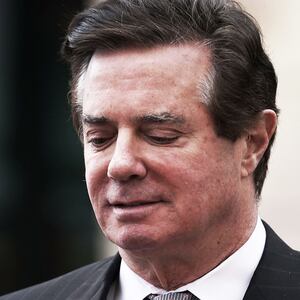Paul Manafort got a sharply reduced sentence of 47 months for fraud on Thursday—from a federal judge who said the political operative known as the “torturers’ lobbyist” had lived an “otherwise blameless life.”
The guidelines called for a sentence of 19 to 24 years, but Judge T.S. Ellis said that was “excessive” and gave President Trump’s former campaign chair less than four years for hiding and evading taxes on millions he made lobbying for Ukrainian political figures.
Before learning his fate, Manafort, 69, sat in a wheelchair and whined that he had been “shamed and humiliated” by scandal.
“The past two years have been the most difficult of my life,” Manafort said, dressed in a green jail jumpsuit that was in stark contrast to the $15,000 ostrich jacket shown as one of the exhibits at his trial.
“The person that the media has described me as is not someone I recognize. To say I have been humiliated and shamed would be a gross understatement.
“The greatest pain I feel is the pain of my family. I thank my family for their outpouring of support. I have had much time to repent. I ask you for your compassion.”
Democrats said Manafort got more than compassion—he got off easy.
“I think I spent more days in detention in high school than Judge Ellis thinks that Paul Manafort should spend in jail for what he did to defraud the United States,” Rep. Eric Swalwell (D-CA) said on MSNBC.
Manafort’s lawyers had argued he deserved a sentencing reduction because of his cooperation with Special Counsel Robert Mueller. But not only did Manafort breach his cooperation agreement, prosecutors said he also never told them anything they did not already know.
Defense lawyers also pointed out that Manafort had no criminal record before the Mueller investigation. And the judge, in a moment that left many agog, agreed that “he has lived an otherwise blameless life”—apparently ignoring, at the very least, his work in the 1980s and 1990s for brutal warlords and strongmen.
Ellis had been critical of Mueller’s team from the start of the case—at one point accusing them of using the indictment to “tighten the screw” on Manafort and get him to cooperate with their probe of possible collusion with Russia during the 2016 election.
And during Thursday’s sentencing hearing, Ellis noted that the case before him did not involve collusion.
Manafort attorney Kevin Downing said outside the courthouse that the lack of collusion evidence was the most important takeaway from the proceedings—which Rep. Adam Schiff (D-CA), head of the House Intelligence Committee, said was a “deliberate appeal for a pardon.”
It remains to be seen how much time Manafort, who has been in jail since June, will end up serving since he faces a second sentencing in another court.
“I prayed for mercy for Paul, Kathy and his family, and here it is,” longtime friend Michael Caputo told The Daily Beast. “But it’s not over yet.”
After Manafort was convicted on the fraud charges in Virginia, he pleaded guilty in a separate Washington, D.C., case to conspiracy against the U.S. government and obstruction of justice charges stemming from an illegal lobbying campaign on behalf of the Ukrainian government.
The judge in that case, Amy Berman Jackson, will sentence Manafort next week. Guidelines call for him to get a maximum of 10 years.
“My fear now is that Judge Jackson will feel compelled to stack time on Paul’s sentence, but I’m hopeful she’ll also see the value of mercy in Paul’s case,” Caputo said.
Jackson has already ruled that Manafort breached his plea agreement by lying to Mueller’s team about his interactions with former business partner Konstantin Kilimnik and in an unspecified investigation in another federal court district. Kilimnik is assessed by the FBI, according to Mueller, of having links to Russian intelligence, and Manafort allegedly shared Trump campaign polling data with Kilimnik in 2016.
Ellis cut Manafort a huge break even as he noted that the political operative had not expressed regret for his crimes.
In the Virginia trial, prosecutors showed how Manafort went from evading taxes when his political consulting career was successful to defrauding banks when his business started to fail.
When he was flush, Manafort used a host of offshore companies and bank accounts in Cyprus and St. Vincent to hide up to $55 million and pay the tab for his lavish lifestyle. He failed to report up to $16 million of that money to the IRS, which shaved his tax bills by $6 million.
The Maidan revolution in 2014 threw Manafort’s pro-Russian clients in Ukraine out of power and effectively gutted his consulting business. With no income and mounting bills, he sought to maintain his lifestyle by applying for loans against his various homes based on a series of lies. Mueller’s office charged him with forging phony profit-and-loss statements and lying to secure more lucrative loan terms.
Manafort volunteered in February 2016 to work for the Trump campaign for free as his finances were at their most desperate. The move seemed like a chance for him to cash in on a new set of political allies and revive his failing consulting business. Instead, Trump fired him in August 2016 amid campaign chaos and growing scrutiny of Manafort’s work in Ukraine.
By late 2016, Manafort had already gotten the attention of law enforcement. His offshore transactions racked up nearly two dozen suspicious activity reports over the course of a decade, and the FBI questioned him in 2013 and 2014 about his offshore accounts. Separately, CNN reported that the FBI obtained a Foreign Intelligence Surveillance Act warrant on Manafort in 2014 stemming from suspicions about his lobbying work on behalf of the Ukrainian government.
Lenient though it may be, the sentence handed down by Ellis marks an end to Manafort’s career in politics and a turning point for the kind of lobbying he pioneered.
During the 1980s and ’90s, Manafort’s firm—Black, Manafort, Stone, and Kelly—signed up with brutal foreign dictators and warlords like Zaire’s Mobutu Sese Seko, Angola’s Jonas Savimbi, and Nigeria’s General Sani Abacha for image rehabilitation campaigns in D.C. The clientele earned Manafort’s firm a reputation as “the torturers' lobby” and a first brush with the Justice Department over allegations that the company had failed to properly report some of its foreign lobbying work.
(One of the partners was Roger Stone, who is also being prosecuted by Mueller for allegedly lying to Congress about his contacts with WikiLeaks).
Manafort’s downfall hasn’t stopped Washington lobbyists from signing up an international rogues gallery of clients, but it has made them more attentive to the law. The Justice Department prosecuted only seven cases of failure to register between 1966 and 2015, which led to a lax and freewheeling atmosphere in the foreign lobbying business that allowed Manafort to flourish. Since the 2016 election and Manafort’s indictment, lobbyists have flocked to register their work with the Justice Department amid stricter enforcement by the agency’s FARA unit.
Betsy Woodruff contributed reporting to this story.









